As a cat owner, I am always proud of myself. I thought I had everything under control. But suddenly, one day, my cat, Momoji, peed on my favorite rug.
At that moment, I was very frustrated and didn’t know what to do. However, after researching and consulting with my vet, I learned that there are several reasons why cats pee outside the litter box.
In this article, I will share what I’ve learned and provide helpful tips on preventing this behavior in cats. So, if you are also one of those owners struggling with a cat peeing outside the litter box, this article will help you.
Kееp rеading!
Why is My Cat Peeing Outside the Litter Box?
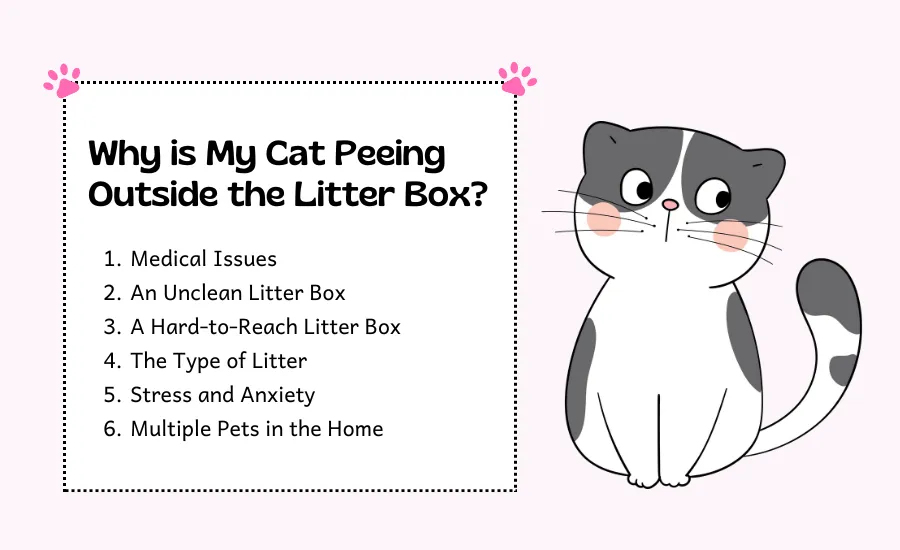
There are several reasons why cats pee outside the litter box. Read about these issues one by one:
Medical Issues
One of the most common reasons why cats pee outside the litter box is due to medical issues. Taking your cat to the vet is essential if you notice any changes in their litter box habits.
The vet will perform some tests to determine if any medical issues are causing your cat to pee outside the litter box.
Once the cause is identified, suitable treatment can be given to your cat. Some of the most common medical issues are:
1. UTI
Urinary tract infections (UTIs) are a widespread medical problem in cats. The most common symptoms of a UTI include painful urination, frequent urination, and blood in the urine. Treatment options for UTIs include medication and changes in the cat’s diet.
However, we recommend seeking veterinary care if you notice your cat has a UTI. If left untreated, it can lead to more serious medical issues.
2. Crystalluria
Crystalluria, also known as urinary crystals, is a condition where crystals form in the urine due to a lack of water.
These crystals can cause discomfort, pain, and even blockage in the urinary tract, making it difficult for your cat to urinate. Common causes of crystalluria include diet, dehydration, and other medical conditions.
3. Bladder Stones
Bladder stones are hard mineral formations that can develop in a cat’s bladder. These stones cause significant pain, discomfort, and blockage that may prevent your cat from urinating.
Common symptoms of bladder stones include blood in the urine, frequent urination, and straining to urinate. Treatment options for bladder stones include surgery, medication, and dietary changes. If your cat is suffering from this issue, contact your veterinarian.
4. Hyperthyroidism
Hyperthyroidism is a condition in which the thyroid gland produces too much thyroid hormone. This condition is most commonly seen in older cats.
Common symptoms of hyperthyroidism include weight loss, increased thirst, and restlessness. Due to symptoms like increased thirst, your cat may drink more water and urinate more frequently.
5. Degenerative joint disease
This disease, also known as arthritis, is a common condition in older cats. It causes inflammation and joint pain, making it difficult for your cat to move and perform everyday activities.
Treatment options for arthritis include medication, weight management, and physical therapy.
6. Kidney Disease
Kidney disease, or chronic renal failure, is a common condition in middle-aged and older cats. It can cause your cat to drink more water and urinate more frequently, which may lead to accidents outside the litter box.
This condition can cause various symptoms, including weight loss, vomiting, and dehydration.
7. Fеlinе idiopathic cystitis
Any change or anxiety in the environment can cause feline idiopathic cystitis. Changes like the location of their litter box can lead to stress in them.
When they feel stressed, they may urinate anywhere. Symptoms of this condition include painful urination, frequent urination, and blood in the urine.
An Unclean Litter Box
Cats arе clеan animals, and they do not likе using a dirty litter box. If thе littеr box is not clеanеd rеgularly, your cat may start pееing outsidе thе littеr box.
It is rеcommеndеd to scoop your cat’s littеr box daily and clеan it wееkly to prеvеnt any littеr box issues.
A Hard-to-Reach Litter Box
Apart from cleanliness, the location also matters for cats. If your cat has arthritis or any other mobility issues, climbing into a high-sided litter box can be difficult for it.
This may cause your cat to pee outside the litter box. In this case, it’s best to switch to a low-sided litter box or provide a ramp to make it easier for your cat to use
Cats are quiet animals. So, according to their personality, they prefer a litter box that is located in a quiet and private area. If the litter box is in a high-traffic area or in a place with a lot of noise and activity, your cat may avoid using it.
Therefore, place the litter box in a location that is convenient and comfortable for your cat.
The Type of Litter
The type of litter you use can also cause your cat to pee outside the litter box. Cats are picky about the type of litter they use. Some cats are sensitive to scented litter, which may cause them to avoid the litter box.
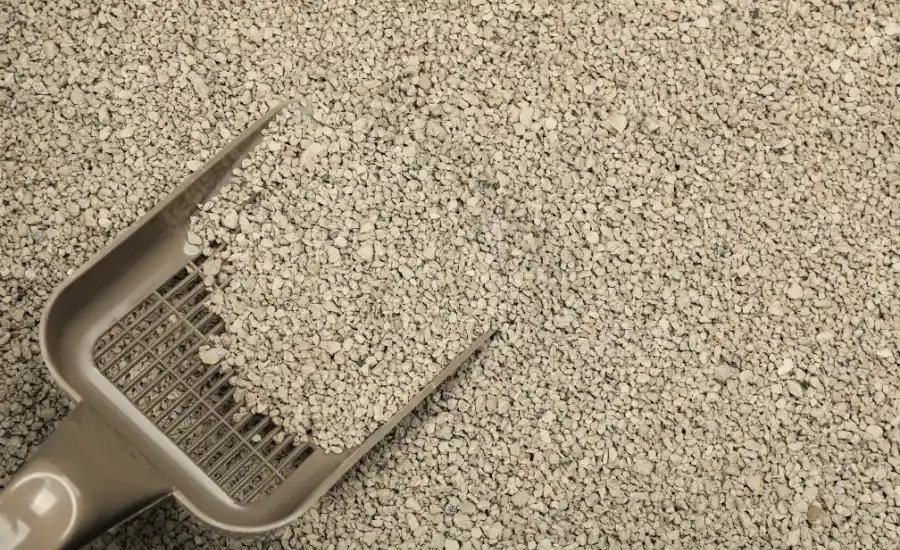
Additionally, if your cat is allergic to the litter, it can cause them to pee outside the litter box. In this case, it is recommended to use unscented litter.
Try different types of litter to see which one your cat prefers. This will not only encourage your cat to use the litter box but also help maintain their health and comfort.
Stress and Anxiety
Cats are sensitive animals. Any change in their environment can cause them stress and anxiety, which may lead to them peeing outside the litter box.
Stressful situations such as moving to a new home, changes in daily routines, adding new pets, or changes in the family can make your cat feel anxious.
It is recommended that you provide a safe and secure environment for your cat and reduce any stress that may be causing anxiety.
Multiple Pets in the Home
As discussed above, adding pets to the house can cause your cat to feel insecure. Also, if you have multiple pets, choosing a litter box that meets everyone’s needs is essential.
For example, if one pet is allergic to a specific type of litter, it is necessary to switch to a different type of litter that is safe for all pets in the household.
It’s also important to consider the number of litter boxes available to prevent overcrowding and territorial disputes.
Check Out: Cat Pooping Outside Litter Box? Here’s What You Can Do
How to Get the Best Litter Box Setup
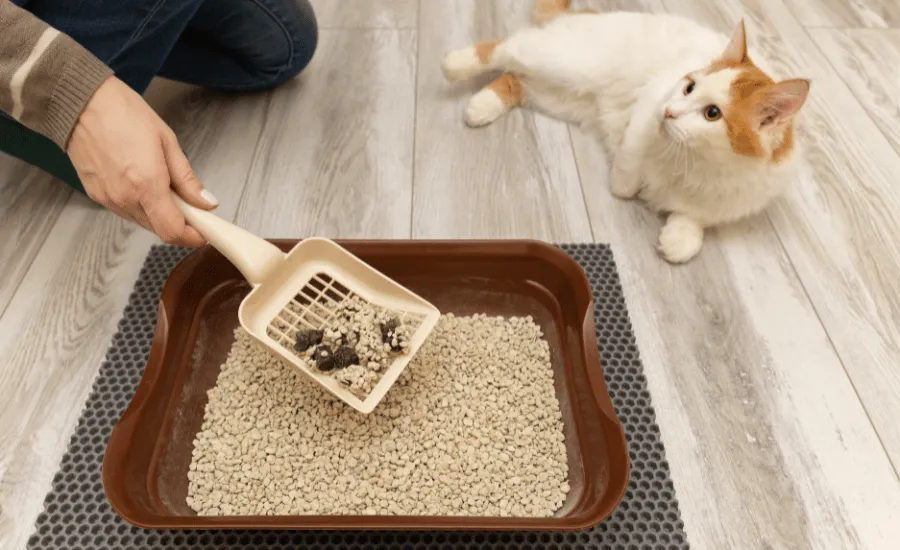
Getting the best litter box setup for your furry friend is essential for their health and happiness. Here are some pointers to help you create the perfect litter box setup:
- Choosе the correct littеr box size: Make sure your litter box is large enough for your pet to move around comfortably. A good rule of thumb is to choose a box that is 1.5 times the length of your pet.
- Choosе thе right littеr: There are many types of litter available, so choose the one that works best for you and your pet. Some popular types include clay, clumping, ramp, and natural.
- Kееp it clean: Rеgularly clеaning your littеr box is essential for your pеt’s hеalth. Be sure to scoop out any solids daily and changе thе littеr еvеry two to thrее wееks.
- Location: Choose a location that is easily accessible for your pet and is not too far away from their food and water source.
- Multiplе boxеs: If you have more than one pet, consider having multiple litter boxes to avoid any potential conflicts.
By following these setup pointers, you can provide your pet with a clean, comfortable, and healthy litter box setup.
Conclusion
With the right approach, you can stop your cat from peeing outside the litter box. It’s simple: you just need to observe their behavior, provide a healthy environment, and keep your cat’s mental health in check.
If nothing works, visit the vet for routine care as soon as possible. By following all the mentioned tips and tricks, you can maintain a happy and healthy relationship with your furry friend.
FAQs
Why is my cat peeing on the floor but pooping in the litter box?
There are several reasons why your cat is peeing on the floor but pooping in the litter box. It could be due to a medical issue, litter box problems, or stress and anxiety. It is recommended to take your cat to the vet to avoid any potential medical issues.
How can I tеll if my cat has a UTI?
Some of the signs that your cat may have a UTI include peeing outside the litter box, frequent urination, blood in the urine, and excessive licking of the genital area. If you notice any of these symptoms, taking your cat to the vet for a check-up is crucial.
How do I stop my cat from pееing on things?
To stop your cat from peeing on things, first, you need to identify the reason behind this behavior. It could be a medical problem, litter box issues, or stress and anxiety. If it’s a medical issue, consult with the vet. If it’s a behavioral issue, change your cat’s litter box setup or provide more mental and physical stimulation to reduce it.

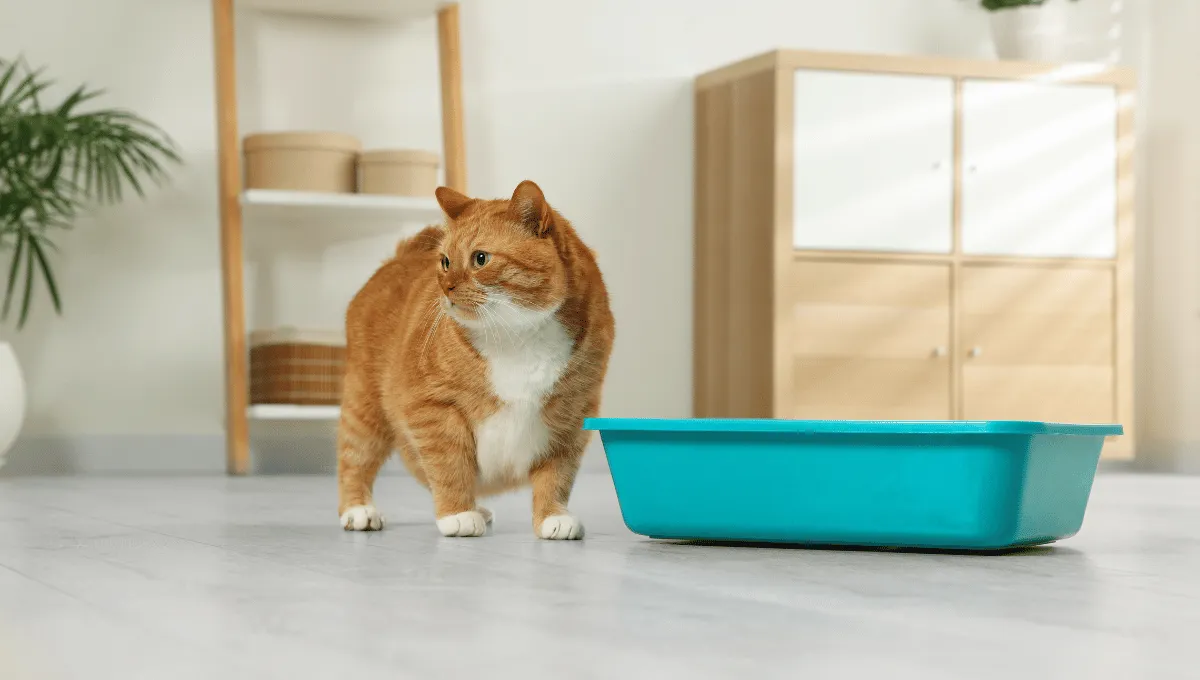

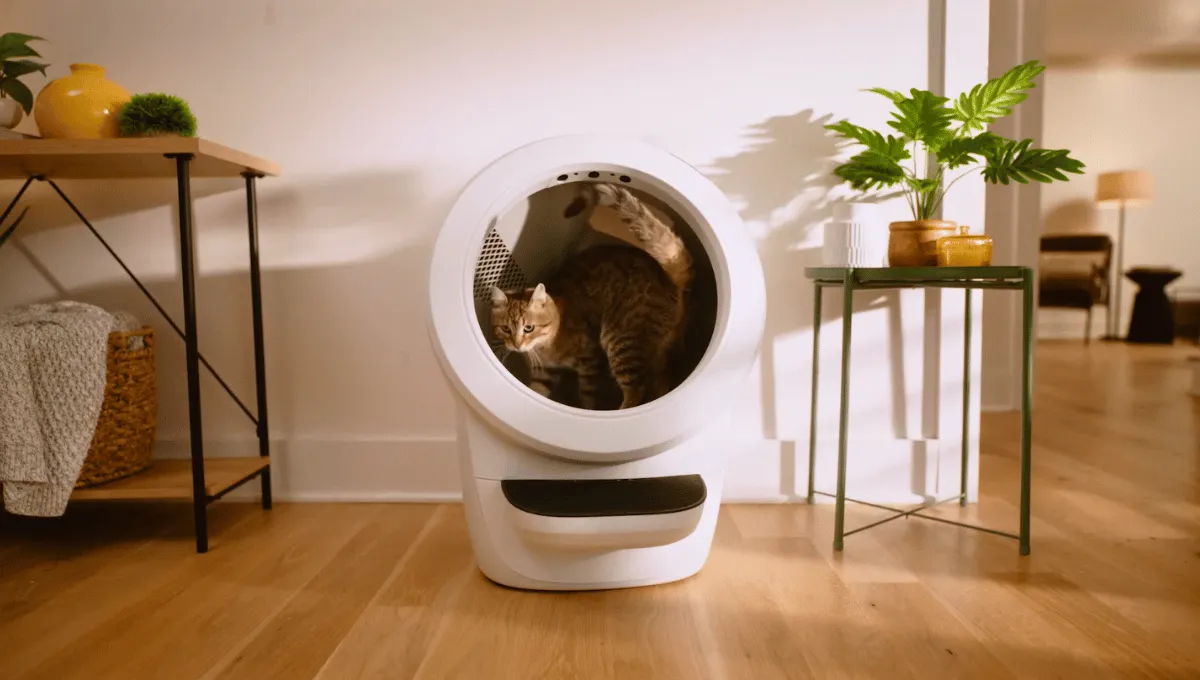
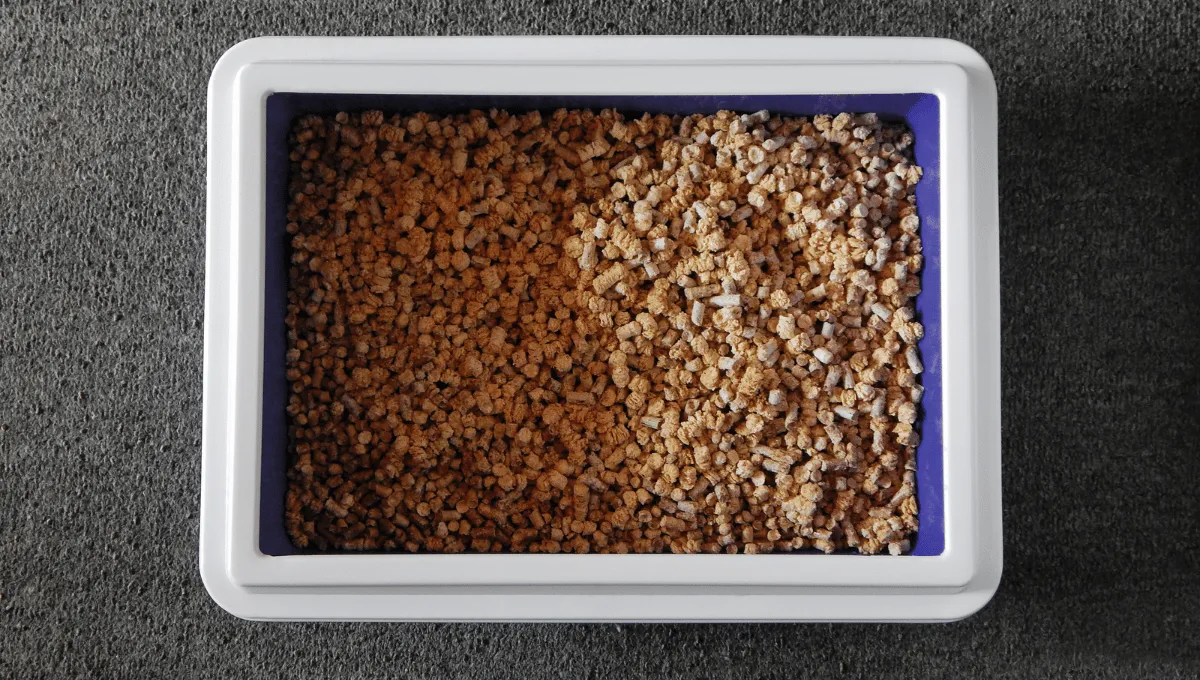
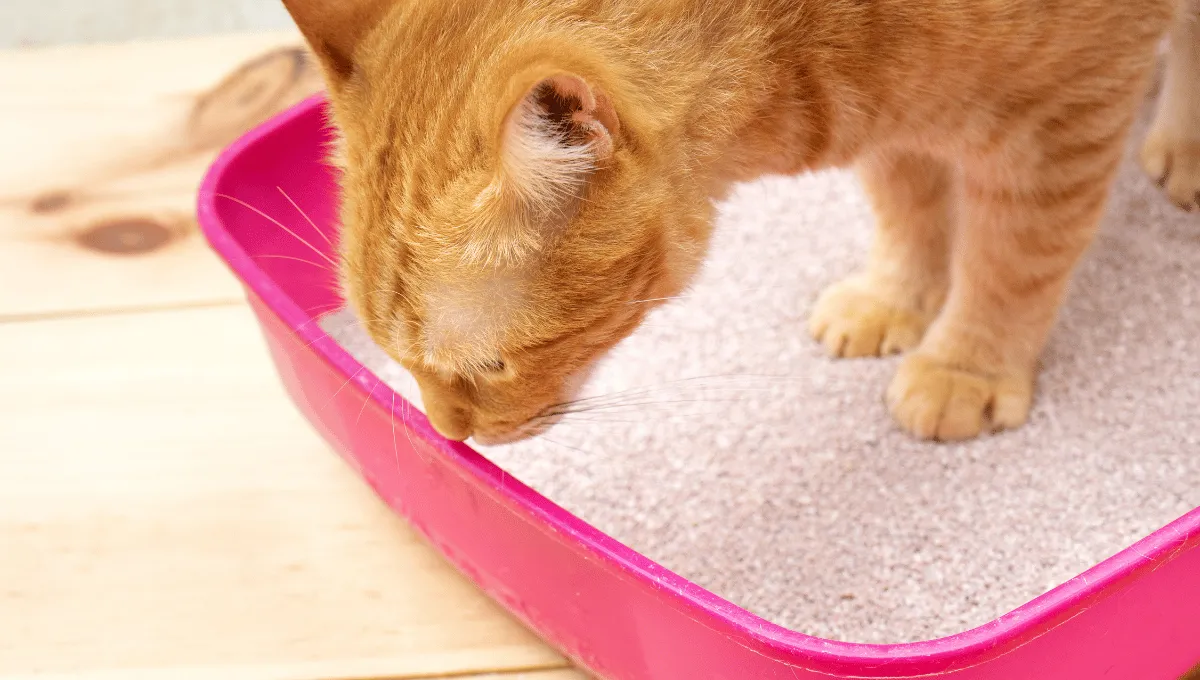
0 Comments